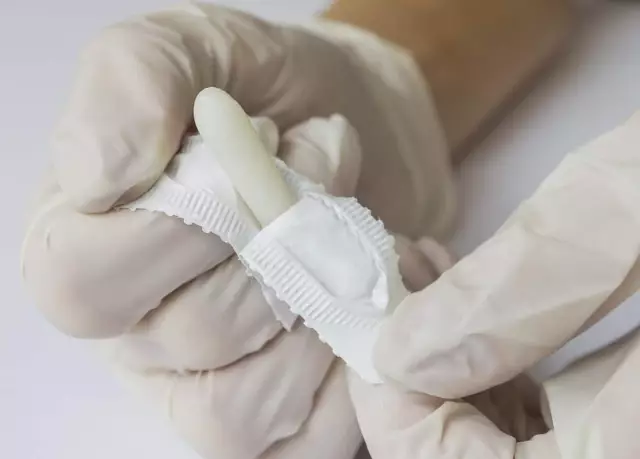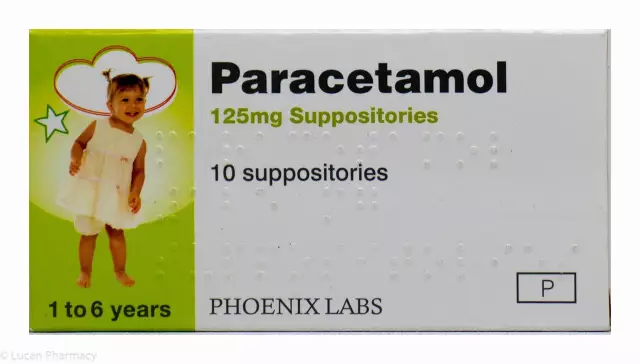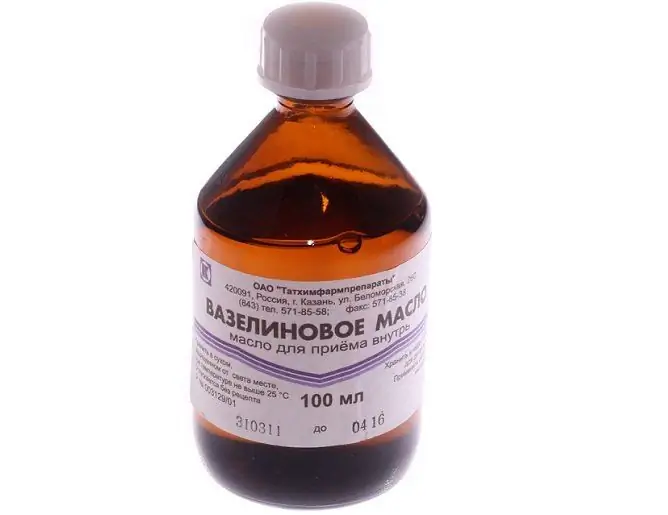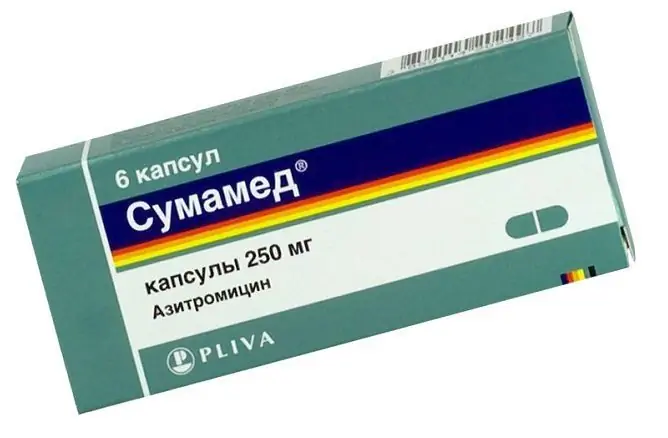- Author Rachel Wainwright wainwright@abchealthonline.com.
- Public 2023-12-15 07:39.
- Last modified 2025-11-02 20:14.
Ibuprofen for children
Ibuprofen for children: instructions for use and reviews
- 1. Release form and composition
- 2. Pharmacological properties
- 3. Indications for use
- 4. Contraindications
- 5. Method of application and dosage
- 6. Side effects
- 7. Overdose
- 8. Special instructions
- 9. Use in childhood
- 10. In case of impaired renal function
- 11. For violations of liver function
- 12. Drug interactions
- 13. Analogs
- 14. Terms and conditions of storage
- 15. Terms of dispensing from pharmacies
- 16. Reviews
- 17. Price in pharmacies
Latin name: Ibuprofen for kids
ATX code: M01AE01
Active ingredient: ibuprofen (Ibuprofen)
Producer: Altpharm LLC (Russia)
Description and photo update: 2019-11-07
Prices in pharmacies: from 78 rubles.
Buy

Ibuprofen for children is a topical drug with analgesic, anti-inflammatory and antipyretic effects, used in children aged 2 months to 3 years.
Release form and composition
Dosage form - rectal suppositories: almost white or white, torpedo-shaped (in a cardboard box there are 2 blister packs of 5 suppositories and instructions for the use of Ibuprofen for children).
Composition of 1 suppository:
- active substance: ibuprofen - 60 mg;
- excipients: glycerides of fatty acids (solid fat, Witepsol N 15) - 740 mg.
Pharmacological properties
Pharmacodynamics
The active substance of Ibuprofen for children has analgesic, antipyretic and anti-inflammatory effects. When using the drug in the central nervous system by influencing the centers of thermoregulation and pain, an indiscriminate blockade of COX-1 and -2 (cyclooxygenase-1 and -2) occurs, as well as inhibition of the synthesis of prostaglandins, which are mediators of inflammation and pain. The most pronounced analgesic effect in pain syndrome of an inflammatory nature. The duration of the effect of the drug is up to 8 hours.
Ibuprofen exhibits antiplatelet activity.
Pharmacokinetics
The substance binds to plasma proteins at a level of 90%. Pre-systemic and post-systemic metabolism occurs in the liver. After absorption, approximately 60% of the R-form of ibuprofen (it does not possess pharmacological activity) is gradually converted into the active S-form. Metabolism occurs with the participation of the isoenzyme CYP2C9. The elimination process takes place in two phases, T 1/2 (half-life) is in the range from 2 to 2.5 hours. Excretion is carried out mainly by the kidneys (excretes no more than 1% unchanged), to a lesser extent - with bile.
Indications for use
Ibuprofen for children is prescribed to patients aged 2 months to 3 years with the following indications:
- acute respiratory diseases, influenza, childhood infections, post-vaccination reactions and other infectious and inflammatory diseases that occur with an increase in body temperature (as an antipyretic agent);
- pain syndrome of mild to moderate intensity, including headache and toothache, migraine, neuralgia, sprains pain, sore throat and ear pain, and other types of pain (as a pain reliever).
Contraindications
Absolute:
- renal / hepatic impairment;
- bronchial asthma, urticaria, rhinitis associated with therapy with acetylsalicylic acid (salicylates) or other non-steroidal anti-inflammatory drugs;
- active gastrointestinal bleeding;
- ulcerative lesions of the gastrointestinal tract;
- hypokalemia (confirmed);
- inflammatory bowel disease;
- hearing loss;
- blood diseases, including hypocoagulation, leukopenia, hemophilia;
- individual intolerance to the components of the drug, as well as acetylsalicylic acid or other non-steroidal anti-inflammatory drugs.
Relative (rectal suppositories Ibuprofen for children are used under medical supervision):
- liver or kidney disease;
- a history of indications of gastritis, peptic ulcer disease, ulcerative colitis, bleeding of the gastrointestinal tract;
- the presence of Helicobacter pylori;
- combination therapy with other pain relievers;
- combined use with indirect anticoagulants (oral drugs that reduce blood clotting), antiplatelet agents, glucocorticosteroids, diuretics, methotrexate, lithium drugs, drugs to lower blood pressure;
- urticaria, bronchial asthma.
Ibuprofen for children, instructions for use: method and dosage
Suppositories are used rectally.
The dosage of Ibuprofen for children when used to treat fever (fever) and pain is determined by the age and weight of the child. Single dose - 5-10 mg / kg, frequency of application - 3-4 times a day. The maximum is 30 mg / kg per day.
The recommended single dose is 1 suppository, frequency of application:
- child's weight 5.5-8 kg (age 3-9 months): 3 times a day with interruptions of 6-8 hours, maximum - 3 suppositories a day;
- child's weight 8-12.5 kg (age from 9 months to 2 years): 4 times a day, 6 hours apart, maximum 4 suppositories a day.
For post-immunization fever, the recommended dosage of Ibuprofen for children is 1 suppository. Children over 1 year of age may receive another suppository after 6 hours.
If Ibuprofen is prescribed for children as an antipyretic agent, the duration of its use should not exceed 3 days. In cases where the condition does not improve, it is necessary to consult a doctor. As an anesthetic, the drug can be used for no longer than 5 days.
Side effects
Against the background of Ibuprofen therapy for children, adverse events are rare. Possible side effects:
- allergic reactions: bronchospasm, exacerbation of bronchial asthma, skin rash, urticaria, pruritus, anaphylactoid reactions, angioedema, anaphylactic shock, fever, toxic epidermal necrolysis, exudative erythema multiforme;
- gastrointestinal tract: laxative effect, vomiting, nausea, pain or discomfort in the epigastrium, erosive and ulcerative lesions, bleeding;
- cardiovascular system: increased blood pressure, tachycardia;
- nervous system: psychomotor agitation, dizziness, headache, insomnia;
- urinary system: cystitis, impaired renal function;
- hematopoietic organs: anemia, agranulocytosis, thrombocytopenia, leukopenia.
Overdose
The likelihood of an Ibuprofen overdose in children is very low. If you exceed the recommended dose, you should consult a doctor.
The main symptoms: renal failure, tinnitus, abdominal pain, vomiting, nausea, headache, acute bradycardia, decreased blood pressure, tachycardia, metabolic acidosis, coma.
Therapy: Forced diuresis is shown, symptomatic treatment.
special instructions
There is no information.
Pediatric use
Rectal suppositories Ibuprofen for children is allowed to be used in pediatrics in patients aged 2 months.
With impaired renal function
- renal failure: the use of Ibuprofen for children is contraindicated;
- kidney disease: therapy should be administered with caution.
For violations of liver function
- liver failure: the use of Ibuprofen for children is contraindicated;
- liver disease: therapy should be carried out with caution.
Drug interactions
- anticoagulants: with simultaneous use, their effect may increase;
- digoxin, phenytoin, methotrexate, lithium preparations: the plasma concentration of these drugs may increase;
- diuretics and drugs with antihypertensive action: when combined, their effectiveness decreases;
- mineralocorticosteroids and glucocorticosteroids: adverse events from the use of these drugs may increase.
Analogs
Ibuprofen analogs for children are: Nurofen for children, Advil for children, Brudol for children, Children's Motrin, Maxikold for children, MIG for children, MIG for babies, etc.
Terms and conditions of storage
Store in a place protected from light at temperatures up to 25 ° C. Keep out of the reach of children.
Shelf life is 2 years.
Terms of dispensing from pharmacies
Available without a prescription.
Reviews about Ibuprofen for children
Reviews about Ibuprofen for children are different. Some describe it as an inexpensive and effective remedy, but there are responses that the drug has insufficient antipyretic effect, and also causes a burning sensation at the injection site.
The price of Ibuprofen for children in pharmacies
The approximate price for Ibuprofen for children (10 suppositories in a package) is 75-85 rubles.
Ibuprofen for children: prices in online pharmacies
|
Drug name Price Pharmacy |
|
Ibuprofen for children rectal suppositories. 60mg 10 pcs. RUB 78 Buy |
|
Ibuprofen for children (suppositories) 60 mg rectal suppositories 10 pcs. 89 RUB Buy |

Maria Kulkes Medical journalist About the author
Education: First Moscow State Medical University named after I. M. Sechenov, specialty "General Medicine".
Information about the drug is generalized, provided for informational purposes only and does not replace the official instructions. Self-medication is hazardous to health!






